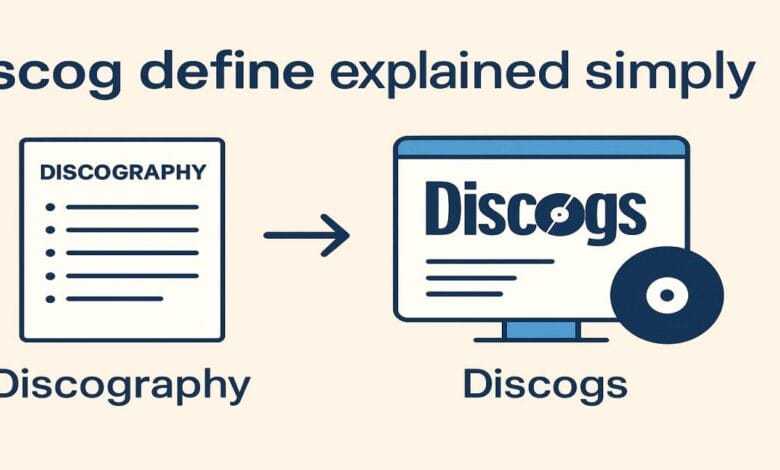Discog Define explained simply

Introduction — what Discog define means
If you typed Discog define, you’re probably asking: What does “discog” mean? Short answer: “Discog” is an informal term that usually refers to either a musician’s Discography (a list of recordings) or to Discogs (the popular online music database and marketplace). This article explains both meanings in plain language, shows how people use each, and gives simple tips for finding and using Discogs/Discographies.
Two common meanings of “Discog”
- Discography (short: discog) — a list or catalogue of recordings by a musician or band. It shows albums, singles, EPs, release dates, labels, and sometimes credits (who played, produced, wrote).
- Discogs (often called “Discog” colloquially) — a user-built website and marketplace for music releases. It contains detailed release pages, artist pages, and tools for collectors to track their collections and buy/sell records.
Both uses are common. If someone writes “check the discog,” they might mean “look at the discography” or “look up the release on Discogs.” Context usually tells you which.
What a discography (discog) includes
A typical artist discography lists:
- Albums (studio, live)
- EPs and singles
- Compilations and soundtracks
- Release dates and record labels
- Formats (vinyl, CD, digital) and catalog numbers
- Tracklists and sometimes credits (musicians, producers)
- Variants (different country pressings, reissues, remasters)
Discographies help fans, journalists, researchers, and collectors understand an artist’s recorded history.
What Discogs (the website) offers
Discogs is a massive, community-built database used by collectors and music fans. Key features:
- Artist profile pages with full discographies.
- Release pages listing formats, tracklists, label info, and credits.
- Marketplace to buy and sell records, CDs, and tapes.
- Collection and wantlist tools to manage what you own or want.
- Submission system so users add or correct releases (with moderation rules).
If you need release-level details—like the exact catalogue number, matrix runout, or whether a pressing is first edition—Discogs is often the place collectors go.
How to use a “discog” (step-by-step)
- Decide which meaning you need. Looking for a quick list? Use a discography. Looking for a marketplace item or pressing details? Use Discogs.
- Search by artist or title. On Discogs or in articles, type artist + album to find the release.
- Compare versions. Many releases have multiple pressings — check year, country, and catalog number.
- Use credits for research. Producers, session players, and engineers are often listed.
- Track condition and value. On the Discogs marketplace, you can see prices and seller notes for condition (useful for buyers/sellers).
Quick example (mini discography)
Imagine a band, The Blue Trees:
- Green Dawn — Album — 2017 — Label A — CD / LP
- Evening EP — EP — 2019 — Label B — Digital only
- Live at Bay Hall — Live album — 2021 — Label A — Vinyl (limited)
That list — albums with years and formats — is a simple discography or “discog.”
Related terms you might see
- Discography — full list of recordings (formal term).
- Release — a specific issue of an album or single.
- Pressing / pressing info — details about a vinyl run.
- Catalog number — label identifier for a release.
- Matrix/runout — etched vinyl codes used to identify pressings.
- Reissue / remaster — later versions of a release.
SEO & reader tips when writing about “discog define”
- Use clear headings and short paragraphs so readers find answers fast.
- Give examples and simple definitions rather than long, abstract language.
- Avoid stuffing the keyword “discog define” repeatedly — use synonyms (discography, Discogs, release) for natural flow.
- If you cite a source (like Discogs.com), link to it from your site where appropriate — that helps trustworthiness.
FAQs: About Discog Define
Q: Is “Discog” spelled the same as Discogs?
A: Not exactly. Discog is an informal shorthand; Discogs (with an “s”) is the site name.
Q: Can “Discog” mean just one album?
A: Usually, it refers to a set of recordings. For one album, people say “release” or “album.”
Q: Where can I find accurate Discogs/Discographies?
A: Use official artist sites, label pages, music encyclopedias, and Discogs for detailed collector-level info.
Conclusion
When someone searches Discog define, they want a clear explanation. Simply put: a Discog can mean a musician’s Discography (their recorded works) or be shorthand for Discogs, the online music database and marketplace. Both uses are helpful—discographies organize an artist’s history; Discogs gives deep, release-level detail and a place to buy or sell. Use the one that fits your need: general info (discography) or detailed collector info (Discogs).
Let’s check our other article- TroozerCom




